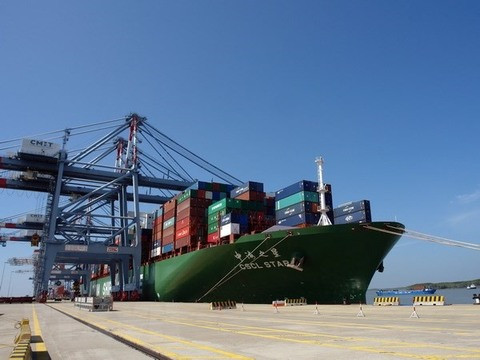
A container ship docked at Cai Mep-Thi Vai international port in Ba Ria-Vung Tau Province. In 2023 - 2024, lower sea freight rates will support global trade activities. —VNA/VNS Photo
In the context of rising interest rates and the rising US dollar, many port and shipping companies are confronting difficulties, but there are still beneficiaries.
Good growth in 2022
According to the Viet Nam Maritime Administration, in 2022, the total volume of cargo throughput via seaports was estimated at 733.18 million tonnes, up 4 per cent compared to 2021. Exports reached 179.07 million tonnes, down 3 per cent compared to 2021. Imports reached 209.26 million tonnes, down 2 per cent. Domestic goods reached 342.79 million tonnes, up 12 per cent. The volume of container cargo through the seaports in 2022 was estimated at 25.09 million TEUs, up 5 per cent compared to 2021.
At the conference held last month by the Viet Nam Maritime Administration to evaluate the work results in 2022 and deploy the key tasks in 2023, Deputy Minister of Transport Nguyen Xuan Sang assessed that the Vietnamese fleet has met 100 per cent of the demand for goods transportation. The volume of cargo transported on international routes of Viet Nam's fleet in 2022 increased by more than 10 per cent compared to last year, reaching nearly 1.3 million tonnes of cargo.
"Revenue and profit of shipping companies both increased, possibly partly due to increased freight rates, but fleet quality also continued to improve, so did the fleet structure," Sang said.
According to VNDirect's estimates, in the first nine months of 2022, the revenue of listed shipping companies increased by 73.7 per cent over the same period of the previous year, mainly thanks to the high sea freight rates contracted by the companies. Gross profit margin also improved by 13.0 percentage points due to the increase in scale. As a result, net profit of listed shipping companies increased by 70.8 per cent, in which The Hai An Transport and Stevedoring JSC (HAH) recorded the strongest net profit growth of 171.8 per cent thanks to strong fleet expansion in 2022.
However, in the international market, after a period of rapid growth, sea freight rates suddenly dropped. This is the result of the weakening of global freight demand while the market expects an increase in supply in the near future.
According to Alphaliner, the number of new shipbuilding orders continues to increase, bringing current orders to 27.9 per cent of total market capacity, the highest level since 2012. The global fleet could grow by 4.4 per cent and 8.2 per cent year-on-year in 2022 and 2023 due to new orders being delivered, while global cargo throughput may increase only by 0.9 per cent and 2.7 per cent in 2022 and 2023 due to the global economic recession.
VNDirect forecasts that the oversupply will put great pressure on sea freight rates in the near future. Business results of shipping lines see a certain lag with fluctuations in sea freight rates because charter contracts usually last from 6 to 12 months. Therefore, the impact of the reduction in sea freight rates will begin to reflect on the business results of shipping companies in the 2023-2024 period.
However, analysts still see a number of positive factors that could somewhat mitigate the negative impact of the price reduction. First, China is on track to reopen, which will boost global trade and consumption. Second, the average Brent oil price is forecast to remain around $90 per barrel in 2023, which will help reduce fuel costs for shipping companies.
Stocks
In 2023 - 2024, VNDirect believes lower sea freight rates will support global trade activities. Besides, the shortage of containers – the main factor causing seaport congestion – will be solved thanks to the additional volume of containers. With ports operating at 100 per cent capacity after the pandemic, the number of ships waiting in line has been eased in the main port areas. The reopening of China could offset the weakening global economy, providing a neutral outlook for the global port industry.
Experts also expect that Viet Nam's container throughput will increase by 2.5 per cent year-on-year in 2022 to 24.9 million TEUs after a growth of 2.9 per cent in 10 months of 2022.
In the seaport master plan for the 2021 - 2030 period, among Viet Nam's major port clusters, Hai Phong port cluster and Cai Mep – Thi Vai port cluster are classified as Viet Nam's special port clusters and will be most developed. Therefore, these two port clusters will have more growth potential in 2023 - 2024
For businesses, VNDirect believes that the interest rate increase will help Port of Hai Phong JSC (PHP), Viet Nam Container Shipping Joint Stock Corporation (VSC) and Viet Nam Ocean Shipping JSC (VOS) benefit in the near future. Of which, PHP will be the most profitable. In contrast, Hai An Transport and Stevedoring JSC (HAH) and Gemadept Shipping Holding Co Ltd (GMD) may be affected because these companies plan to expand scale in the future.
Source: VNS